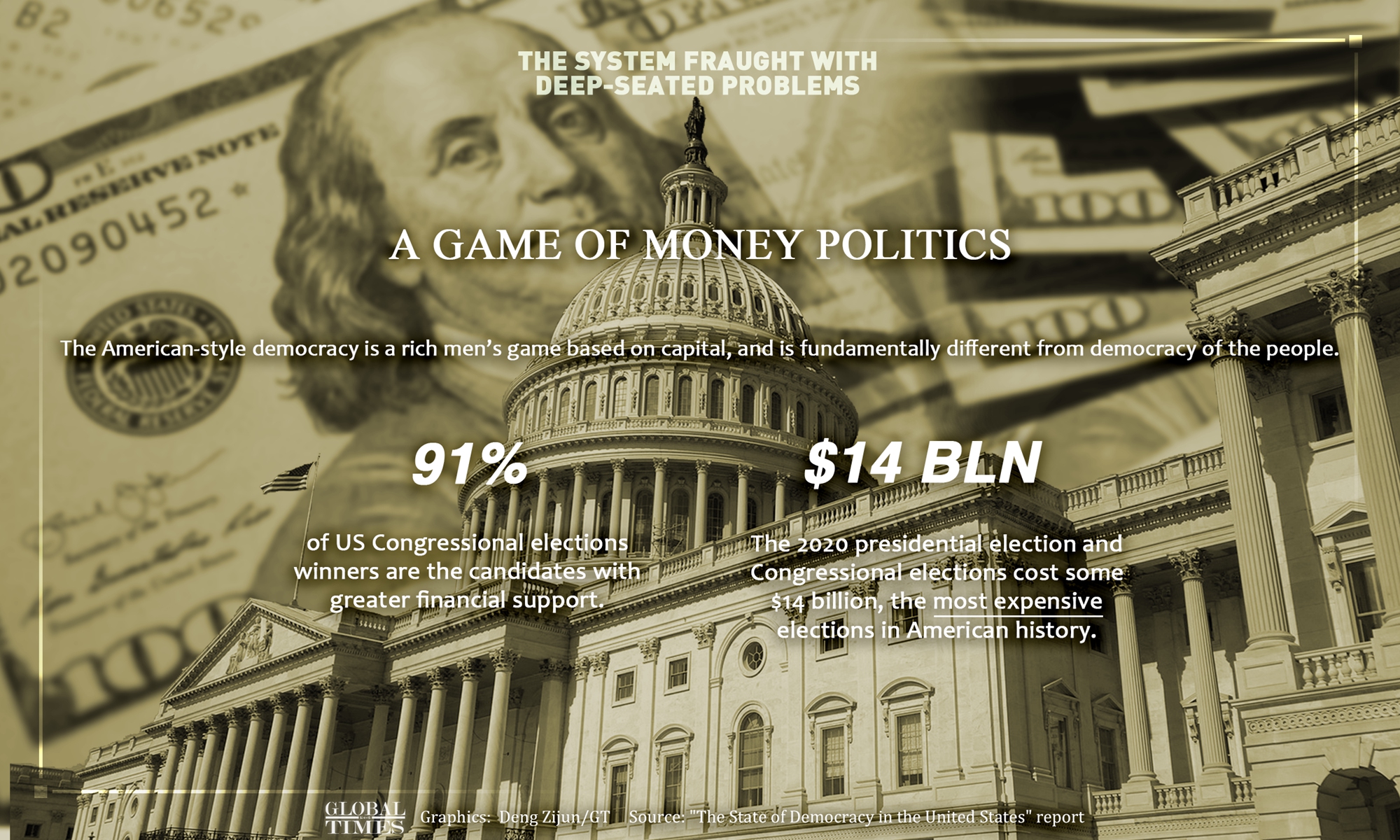
The US-styled democracy fraught with deep-seated problems Graphics: Deng Zijun/GT
In 2005, New Orleans was hard hit by Hurricane Katrina.
Flooding drowned the home of the evacuated and isolated those who chose to stay. The water eventually receded, revealing a hard truth. The people's darkest hour turned out to be a source of revenue - for the city's own mayor Ray Nagin. By using his position, Nagin strong-armed a businessman to fly his family first class abroad just two months after the disaster struck. Worst of all, he steered a business of the urgently-needed redevelopment to a granite company he owned with his sons.
The businessman-turned politician reaped what he sowed - a 10-year sentence in prison with more than 20 charges. But many US politicians like him got away from being held accountable.
"We're by no means the world leader in clean government," so said Harvard Law School Professor Matthew Stephenson, who observed that practices other countries would consider corrupt are, in the US, not only permitted but constitutionally protected. The most prominent of all goes to campaign financing and lobbying.
The law professor's finding certainly holds true in the Congress. Almost 40 percent of total contributions in the 2018 U.S. midterms came from mega-donors who contributed US$10,000 or more, who account for a tiny 0.01 percent of the US population. From 2010 to 2015 alone, according to a study by professors from Princeton and Northwestern University, the 200 most politically active companies in the US spent US$5.8 billion influencing the government with lobbying and campaign contributions.
Elected politicians are on the go, too. Different from their foreign counterparts hitting the road for field trips, US officials spend 30-70% of their time in office fundraising for the next election. For the rest of their business hours, they butter up major donors while doing their job, by making sure the laws they pass keep the big money happy.
Otherwise, their seat will be easily taken by the more devoted ones. After all, nine out of every ten congressional elections in the US are won by candidates with the most financial support. So it is not cynical at all of Bernie Sanders to say "Congress Doesn't Regulate Wall Street. Wall Street Regulates Congress."
The people who Adam Smith called the "masters of mankind", following their maxim of "All for ourselves and nothing for anyone else", have made the US government of the one percent, by the one percent, and for the one percent. Ordinary Americans are thus left out of the political picture, especially after election seasons. They tend to share the feeling that the government doesn't really care what they think. Only twenty-four percent of respondents said in a Pew study in April this year that they trust the federal government, having been let down time and again on everyday matters. Their perception is backed by numbers. Political scientist Martin Gilens concluded that about 70 percent of the US population have no way of influencing policy. If that's not bad enough, check out the Princeton research that found the opinions of up to 90 percent of Americans have essentially no impact at all.
"There are two things that are important in politics. The first is money and I can't remember what the second one is." said Mark Hanna, an American businessman, a Republican Senator as well as chairman of the Republican National Committee over a century ago. The value of openness and frankness should be carried on generations later. It is now seldom mentioned in the US that the 2020 US presidential and congressional elections were the most "cash-burning" ones in the US history, after candidates spent a total of US$14 billion in campaigns. The presidential election alone cost as much as US$6.6 billion, also a record high.
The words of truth about US politics and the revelations that political donations don't just fall at no cost would naturally provoke some thoughts. As "Summit for Democracy" of the US with "addressing and fighting corruption" as one key theme, people wonder if the American hosts would feel a little bit uneasy or unsure to proudly raise the topic among representatives from half of the world.
There may be one quick fix: renaming the meeting "Summit for US Plutocracy" and drafting a checklist for self-correction.
The writer is a commentator on international affairs, writing regularly for Xinhua News Agency, Global Times and CGTN. He can be reached at xinping604@gmail.com
The article was published on New Straits Times.
